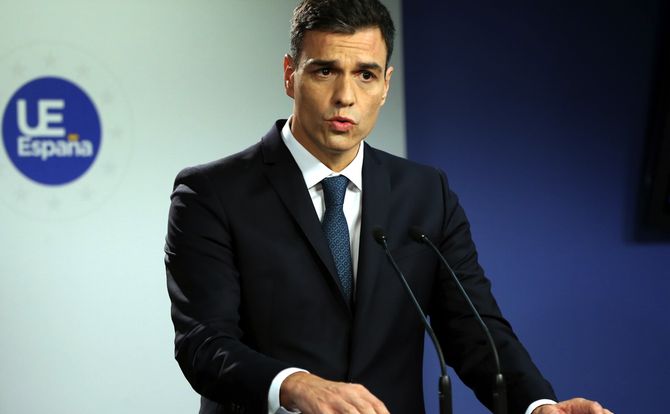An ideological exercise in Spain
From his first moves, the new Prime Minister of Spain Pedro Sanchez looks less like a self-confident democrat and more like an old-line state interventionist intent on consolidating power.

Pedro Sanchez, who twice led Spain’s Socialist Party, the PSOE, to crushing electoral defeats, engineered a parliamentary coup last month that ousted the government of Mariano Rajoy by a tiny margin and succeeded in installing his own minority cabinet.
Mr. Sanchez was helped by two factors. First were the corruption allegations against members of Mr. Rajoy’s People’s Party (PP), and second was backing from the radical, broadly Marxist Podemos party, along with far-left Catalonian separatists. Since the Socialists have only 84 seats in the 350-seat Congress of Deputies, or lower house of parliament, Mr. Sanchez’s government can only function awith the support of these two allies.
Spain’s economic situation improved strongly over the last few years of Mr. Rajoy’s premiership (2011-2018), but voters were unhappy with the political establishment, and incidents of corruption were unfortunately real.
Mr. Sanchez, by contrast, is a far-left socialist, and will now have to consolidate his fragile position by catering to the Marxist ideology of Podemos on one side and the radicalism of Catalan nationalists on the other.
At the same time, the new prime minister is cultivating Brussels with pro-European rhetoric, creating the expectation of drastic improvements in Spain. Mr. Sanchez aspires to play a much stronger European role than his predecessors. He has received recognition on the European Union level by comforting language and a vow to continue Mr. Rajoy’s fiscal consolidation strategy.
Power grab
Nevertheless, a closer look at Mr. Sanchez’s actions shows a disturbing push to consolidate power – both for ideological reasons, and also to satisfy the desires of his Marxist-leaning and separatist allies.
Showing his radical anti-Christian position, the prime minister refused – for the first time in Spanish history – to take the oath of office with a bible or a cross. Even for an atheist, this was an unnecessary demonstration, striking an ideological rather than a simply secular attitude.
Another of his first acts was to replace the head of RTVE, Spain’s public broadcaster, with a personality agreeable to Podemos. This will pave the way for news coverage of the government with a strong pro-left slant. One of Mr. Sanchez’s close associates was also installed at the Centro de Investigaciones Sociologicas (CIS), an influential state-owned institute for public opinion polling.
Optimism about Mr. Sanchez should not blind European observers to clear signs of an internal power grab.
These are clear signs of a strong internal power grab from the left, and certainly not proof of a healthy democratic self-confidence about the government’s intended policies. Optimism about Mr. Sanchez’s “pro-EU” declarations should not blind European observers to these disquieting developments.
As indicated by his recent meeting with Catalan leader Quim Torra, Prime Minister Sanchez will also be forced to court the separatist movements in Catalonia with an opportunistic policy, as he needs their support.
Polarizing force
Pedro Sanchez appears to believe that his youthful vocation to change and lead is irresistible. Youthful elan is certainly good, but it is likely to fail when hitched to an outdated socialist belief in the efficacy of government planning and intervention.
Both in terms of reviving the economy and improving social cohesion, experience has shown that these methods do not work – except sometimes as short-term fixes that bring adverse unintended consequences in the long run.
Certainly Spain – like many other European countries – needs action and reform. Pragmatic leadership and charisma are valuable, but do not express themselves in ideological demonstrations. A mix of ideology, power grabbing, opportunistic policies and activism could prove to be a dangerous cocktail for Spain.
On the European level, the new government could have a similarly detrimental effect. It may give French President Emmanuel Macron an energetic new ally to push his agenda for a more centralized EU. But that might only further alienate other member countries, especially Germany – polarizing rather than integrating an already battered Union.
